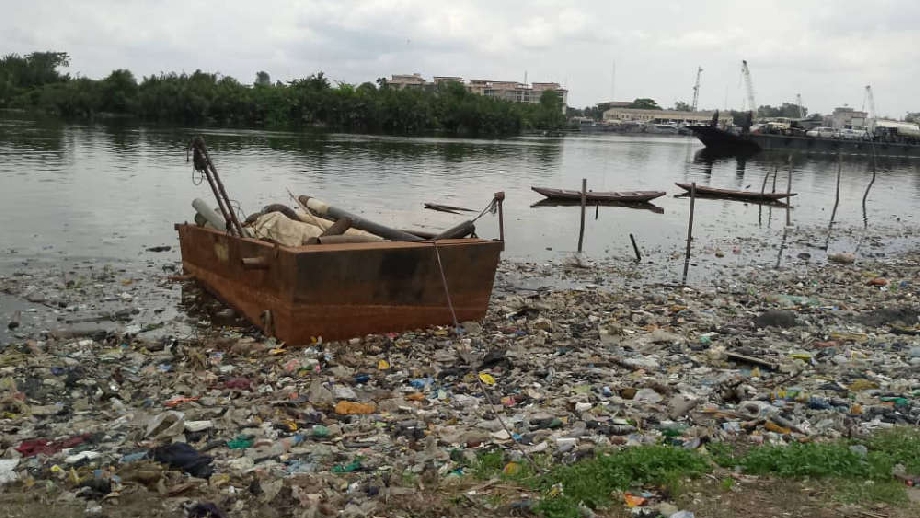
Standing by the creek of Amadi-Ama in Rivers State, Nigeria, you can’t miss the sight of empty plastic bottles and garbage littered by the banks.
“It wasn’t always this way”, the Community Development Committee Chairman of Amadi-Ama, Christian Oribi-Iringe said. “It’s a tourist center; all these actors and actresses used to come here because of the waterfront. During the festive period, you will see different displays.” He regrets the absence of a beachfront due to plastic pollution in the area.
“The Rivers man as you know likes hanging by the waterfront, looking at the water, but because of this refuse and debris, most times we find it difficult to go in, even when you paddle your boat, those things (refuse) will inconvenience you.”
Amadi-Ama Creek
The vital inland waterway located within the Port Harcourt metropolis, Rivers State, Nigeria, is a big part of the waterways in the Niger Delta. It comes from the upper part, where the Bonny River flows into the sea. Both salty ocean water and fresh water from streams and floods influence the water in the creek. The Amadi-Ama Creek flows through several communities, including Rumuobiakani, Mini-Ewa, Oginigba, Woji, and Okujagu. These communities reside along the banks and utilize the creek for various purposes, including fishing, which is a primary source of income for the people.
Plight of Fishermen
Smart Altraide, a fisherman in the area, narrates how he has watched over the years as the once clean and clear water where he had fished for years turned dirty due to plastics and other waste. “Sometimes in a day, if we go fishing, we could get twenty thousand, thirty thousand fish, now to get even ten thousand or five thousand is very hard,” he said.n “Definitely, you must avoid all this dirt before you find a neat place before you put your net, so that’s the problem,” he added.
Mr. Altraide says he and his colleagues would have to worry about the likelihood of their fishing nets breaking during every fishing activity. “You see this waterproof (pointing to the nylon bags littered in the water), when current dey, e dey tear-tear the net. All our fishing nets, all these waterproof dey tear most of them. All these things dey give us problem, that is why we dey suffer much,” he lamented in pidgin English.
The fishermen are increasingly worried over the proliferation of plastic and other forms of waste in the creek. According to Mr. Altraide, “Almost every day from different places or from all the gutters from Mile 1, Ogbunabali, Nkpogu, all the dirt from that side disturbs our River almost every day. We can’t fish. We are suffering because of this dirt. The dirt is so much, so much, so much, that we can’t fish.”
Data on Global Plastic Pollution
Around 19 to 23 million tonnes of plastic waste leak into the world's water ecosystems every year, according to the United Nations Environmental Programme (UNEP). That's the equivalent of 2,000 waste disposal trucks of plastic being dumped into the seas, rivers, and lakes daily, posing great risks to aquatic life and human health. Another data source from earth.org notes that 100 million marine animals die from plastic waste alone every year, and 100,000 marine animals die from getting entangled in plastic. These numbers are based only on the marine animals that are found. The question is how much more goes undiscovered?
According to a UNEP report, improper waste management - which can include anything from inadequate collection systems to careless disposal - leads to a pattern where people illegally dispose of waste in public areas, bodies of water, and natural environments.
Positions on Plastic Pollution
Plastic pollution persists because plastics are easily accessible and affordable, and more people are using them, said environmentalist and member of the Nigerian Environmental Society, Ndubuisi Umesi. “The large proportion of host consumer plastic waste consists mostly of packaging materials. These plastics are inexpensive and durable. As the population is growing geometrically, so is the plastic waste generated, increasing at an exponential pace,” he said. This ties in with the situation across metropolitan areas in Nigeria, where most food vendors use plastic packs like Styrofoam to serve and deliver food.
In the open markets and supermarkets, plastic nylon bags are used to bag items for customers. Water and other various kinds of drinks come in plastic containers. The outcomes of the improper use of plastics are littered roads, clogged drainage systems, and waste washed into larger water bodies during rainfall. A fish seller in Amadi-ama Creek, Blessing, who visits the creek from the neighboring Abuloma community to buy directly from the fishermen, is concerned about the effect the dirty environment would have on her and other traders’ health and general well-being.
“Dirt is not good, as I’m marching it, it’s not good for my health,” she said. “Sometimes if you wan go bath, na im you no go bath again, because all the dirty go cover ya head. Before you go come, shit, all dey ya head,” lamented an elderly woman resident in Amadi-ama Creek. Residents of the creek say their efforts to rid the area of refuse dumps have been inadequate. According to the CDC chairman, Oribi-Iringe, “The fishermen are suffering from it. The companies around them are suffering. We need the government to have an understanding with these companies because the community alone could not do it.”
Other residents agree with this. “If dey go create for us where dustbin go dey. If na motor, put where motor go come carry the dustbin go, push am commot for us, so that we no go dey throway dirty here again,” an elderly woman known as ‘Mama’ suggested. “We dey cry hungry oh, we dey cry dirty dey killi me o. Make dem (government) help,” she added.
UN & Global Efforts
In 2023, the United Nations Environmental Programme convened the third session of its Intergovernmental Negotiating Committee in Nairobi, Kenya. The mission? To forge a global decree to combat plastic pollution, especially in the marine environment. In her opening statement, Inger Andersen, the Under-Secretary-General of the United Nations and Executive Director of the United Nations Environment said, “Nature is suffocating, gasping for breath. All ecosystems, terrestrial and marine are under threat from plastic pollution, our own health is at stake too. We hold in our hands the power to correct this destructive course that our actions have led us on and hopefully heal the planet we call our home.” Also, Kenyan President William Ruto added that “by the threat of plastics to our planet, our health and our future is of such magnitude that it requires all of us, the global south and the global north to develop and execute a global instrument that will help us to neutralize the threat of plastic pollution in our world.”
In commemoration of the 2024 Earth Day at the fourth round of negotiations on the plastic pollution instrument, INC-4 in Ottawa, Canada, UN’s Anderson said there was a need for the world to move closer to an instrument that addresses the full life cycle of plastics. She called on world leaders to agree on clear, measurable time-bound targets, as well as ensure a just transition “for the 20 million waste pickers who form the global sanitation workforce”. She wants the world to say it was “on this Earth Day 2024, that we turned off the plastic tap. That the next generations will grow up in a reuse, refill, reduce and recycle world.”
Ban on Single-use Plastics
By January 2024, the Nigerian government hinted at plans to ban single-use plastics in the country. The Minister of State for Environment, Iziaq Salako, in a statement, urged Nigerians to prepare for “the inevitable ban on some plastics and the holistic circular management of waste in the country.” Lagos, Abia, and Ondo took the lead and announced the ban. Mr. Salako, while commending the Lagos State government for banning the use of styrofoam, also said, “The Federal Ministry of Environment is examining policies and initiatives that will drive the production of alternatives to plastics.”
About 34 African countries have banned various forms of single-use plastics and packaging, 99% of which are made from the fossil fuels that drive climate change. Professor Anthony Onoja of the Institute of Agricultural Research and Development at the University of Port Harcourt believes “there has to be a ban on all non-degradable materials so that people can start embracing renewables”.
Rivers State Government Action
The actions of Rivers State’s past government to clean key creeks like the one in Amadi-Ama are unclear, but the current administration says the creeks across the state are getting the needed attention. The Special Adviser to the Governor on Environmental Sanitation, Prince Obi Ohia, said this was ongoing. “A lot of the creeks and swamps are being de-silted, if you get to Abacha Road, look at the creek there it’s neatly de-silted and they're doing this all across the state.” Mr. Ohia also said a monthly sanitation exercise was also at play. “It looks like monthly sanitation exercise is dear to the heart of the people. We are going to send this across to the governor to give further directives on that,” he said. He also assured that the state government will introduce recycling, “because if we continue to use the waste to landfilling, this is not the best. We will see how we will partner with private individuals to start recycling systems; recycling of plastics, recycling of metals, and that will give the teeming youth a lot of employment and also generate revenue to the state.”
Way Forward
A ban on single-use or other forms of plastics seems like a long-term solution, but how about the improper waste management system in areas where floods during rainfall, wash heaps of refuse into larger water bodies like the Amadi-Ama Creek? Recycling expert Iheoma Njemanze wants the government to tax producers of plastics and use the proceeds to fund recycling plants. “Recycling is such a huge sector now but one thing that cripples it, is lack of access to funding. The government should tax people who produce single-use plastics and use it to subsidize recycling.” On his part, Professor Onoja advocates for wrapping food items with biodegradable materials. “Don’t you feel so close to nature when you go to an eatery and then you carry that wrapped moi moi inside that leaf? We need to bring back those olden days' methods, when we were close to nature,” he added.
British-Italian architect Richard Rogers once said; “The only way forward, if we are going to improve the quality of the environment, is to get everybody involved.” It's been said that “an end to single-use plastics will restore aquatic life.”
Will fishermen like Smart Altraide in Amadi-ama Creek see such a day in their lifetime?


